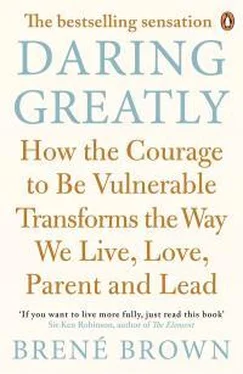Holding my breath, I had this very visceral reaction to what he was saying. It hit me the way only truth can. He let out a long sigh, and as quickly as he had begun, he said, “That’s all I wanted to say. Thanks for listening.” Then he just walked away.
I had spent years researching women and hearing their stories of struggle. In that moment, I realized that men have their own stories and that if we’re going to find our way out of shame, it will be together. So, this section is about what I’ve learned about women, men, how we hurt each other, and how we need each other to heal.
What I’ve come to believe about men and women now that I’ve studied both is that men and women are equally affected by shame. The messages and expectations that fuel shame are most definitely organized by gender, but the experience of shame is universal and deeply human.
WOMEN AND THE SHAME WEB
When I asked women to share their definitions or experiences of shame, here’s what I heard:
Look perfect. Do perfect. Be perfect. Anything less than that is shaming.
Being judged by other mothers.
Being exposed—the flawed parts of yourself that you want to hide from everyone are revealed.
No matter what I achieve or how far I’ve come, where I come from and what I’ve survived will always keep me from feeling like I’m good enough.
Even though everyone knows that there’s no way to do it all, everyone still expects it. Shame is when you can’t pull off looking like it’s under control.
Never enough at home. Never enough at work. Never enough in bed. Never enough with my parents. Shame is never enough.
No seat at the cool table. The pretty girls are laughing.
If you recall the twelve shame categories (appearance and body image, money and work, motherhood/fatherhood, family, parenting, mental and physical health, addiction, sex, aging, religion, surviving trauma, and being stereotyped or labeled), the primary trigger for women, in terms of its power and universality, is the first one: how we look. Still. After all of the consciousness-raising and critical awareness, we still feel the most shame about not being thin, young, and beautiful enough.
Interestingly, in terms of shame triggers for women, motherhood is a close second. And (bonus!) you don’t have to be a mother to experience mother shame. Society views womanhood and motherhood as inextricably bound; therefore our value as women is often determined by where we are in relation to our roles as mothers or potential mothers. Women are constantly asked why they haven’t married or, if they’re married, why they haven’t had children. Even women who are married and have one child are often asked why they haven’t had a second child. You’ve had your kids too far apart? “What were you thinking?” Too close? “Why? That’s so unfair to the kids.” If you’re working outside the home, the first question is “What about the children?” If you’re not working, the first question is “What kind of example are you setting for your daughters?” Mother shame is ubiquitous—it’s a birthright for girls and women.
But the real struggle for women—what amplifies shame regardless of the category—is that we’re expected (and sometimes desire) to be perfect, yet we’re not allowed to look as if we’re working for it. We want it to just materialize somehow. Everything should be effortless. The expectation is to be natural beauties, natural mothers, natural leaders, and naturally good parents, and we want to belong to naturally fabulous families. Think about how much money has been made selling products that promise “the natural look.” And when it comes to work, we love to hear, “She makes it look so easy,” or “She’s a natural.”
As I found myself reading through the pages of definitions and examples provided by women I kept envisioning a web. What I saw was a sticky, complex spiderweb of layered, conflicting, and competing expectations that dictate exactly:
who we should be
what we should be
how we should be
When I think of my own efforts to be everything to everyone—something that women are socialized to do—I can see how every move I make just ensnares me even more. Every effort to twist my way out of the web just leads to becoming more stuck. That’s because every choice has consequences or leads to someone being disappointed.
The web is a metaphor for the classic double-bind situation. Writer Marilyn Frye describes a double bind as “a situation in which options are very limited and all of them expose us to penalty, censure, or deprivation.” If you take competing and conflicting expectations (which are often unattainable from the get-go) you have this:
Be perfect, but don’t make a fuss about it and don’t take time away from anything, like your family or your partner or your work, to achieve your perfection. If you’re really good, perfection should be easy.
Don’t upset anyone or hurt anyone’s feelings, but say what’s on your mind.
Dial the sexuality way up (after the kids are down, the dog is walked, and the house is clean), but dial it way down at the PTO meeting. And, geez, whatever you do, don’t confuse the two—you know how we talk about those PTO sexpots.
Just be yourself, but not if it means being shy or unsure. There’s nothing sexier than self-confidence (especially if you’re young and smokin’ hot).
Don’t make people feel uncomfortable, but be honest.
Don’t get too emotional, but don’t be too detached either. Too emotional and you’re hysterical. Too detached and you’re a coldhearted bitch.
In a US study on conformity to feminine norms, researchers recently listed the most important attributes associated with “being feminine” as being nice, pursuing a thin body ideal, showing modesty by not calling attention to one’s talents or abilities, being domestic, caring for children, investing in a romantic relationship, keeping sexual intimacy contained within one committed relationship, and using our resources to invest in our appearance.
Basically, we have to be willing to stay as small, sweet, and quiet as possible, and use our time and talent to look pretty. Our dreams, ambitions, and gifts are unimportant. God forbid that some young girl who has the cure for cancer tucked away in her abilities finds this list and decides to follow the rules. If she does, we’ll never know her genius—and I feel sure of that. Why? Because every successful woman whom I’ve interviewed has talked to me about the sometimes daily struggle to push past “the rules” so she can assert herself, advocate for her ideas, and feel comfortable with her power and gifts.
Even to me the issue of “stay small, sweet, quiet, and modest” sounds like an outdated problem, but the truth is that women still run into those demands whenever we find and use our voices. When the TEDxHouston video went viral, I wanted to hide. I begged my husband, Steve, to hack into the TED website and “bring the entire thing down!” I fantasized about breaking into the offices where they were keeping the video and stealing it. I was desperate. That was when I realized that I had unconsciously worked throughout my career to keep my work small. I loved writing for my community of readers, because preaching to the choir is easy and relatively safe. The quick and global spread of my work was exactly what I had always tried to avoid. I didn’t want the exposure, and I was terrified of the mean-spirited criticism that’s so rampant in Internet culture.
Well, the mean-spiritedness happened, and the vast majority of it was directed to reinforcing those norms that we’d love to believe are outdated. When a news outlet shared the video on their site, a heated debate erupted in the comments section of their website about (of course!) my weight. “How can she talk about worthiness when she clearly needs to lose fifteen pounds?” On another site, a debate grew about the appropriateness of mothers having breakdowns. “I feel sorry for her children. Good mothers don’t fall apart.” Another commenter wrote, “Less research. More Botox.”
Читать дальше






![Брене Браун - Вопреки. Как оставаться собой, когда всё против тебя [litres]](/books/436389/brene-braun-vopreki-kak-ostavatsya-soboj-kogda-v-thumb.webp)





